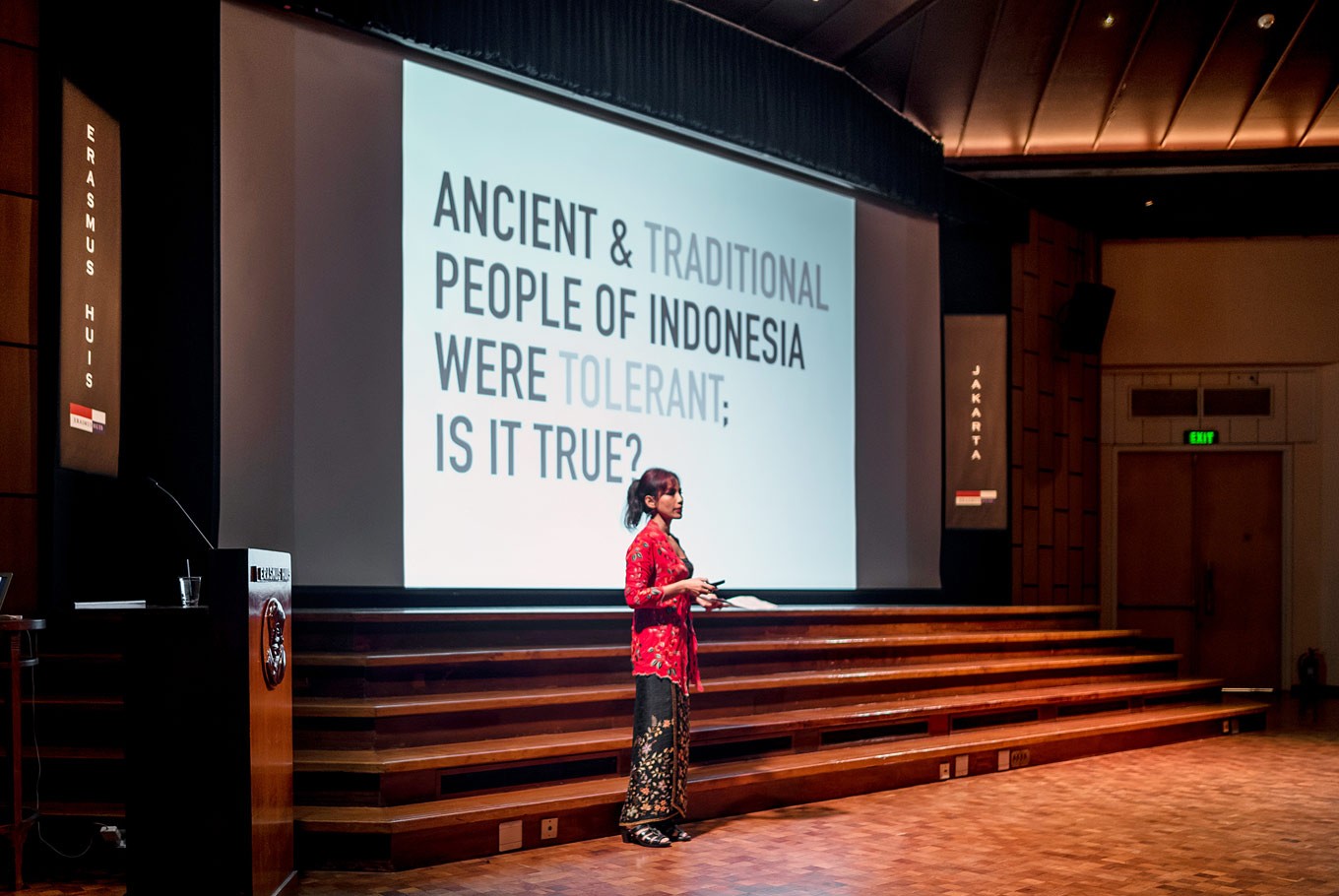Ayu Utami: On the Reform era, 20th anniversary of 'Saman'
With religious intolerance on the rise, is Indonesia progressing or regressing 20 years after the start of the Reform Era? Author Ayu Utami, whose groundbreaking novel Saman was the zeitgeist of that era, reflects upon this issue.
Change Size
 Learning from history: Ayu Utami speaks about the root of intolerance during a lecture hosted by the Indonesian Heritage Society at Erasmus Huis, Kuningan, South Jakarta. (Indonesian Heritage Society/Carel de Groot)
Learning from history: Ayu Utami speaks about the root of intolerance during a lecture hosted by the Indonesian Heritage Society at Erasmus Huis, Kuningan, South Jakarta. (Indonesian Heritage Society/Carel de Groot)
I
ndonesians who grew up in the 1990s will still remember the impact that Ayu Utami’s debut novel Saman had. The novel was published just nine days before the totalitarian New Order regime of Soeharto was overthrown on May 21, 1998, after retaining power for 32 years.
The novel sheds light on issues considered taboo during the New Order era, such as military violence, corporate despotism and the repression of women’s sexuality — all of which conspire to marginalize disadvantaged segments of Indonesian society.
The story is told through the eyes of four female friends, along with the titular male character Saman, a former Catholic priest who turns into a human rights activist.
Many Indonesian readers found the novel shocking for its candid depiction of issues that were censored by the New Order era, while others considered it liberating.
Before launching her literary career, Ayu was a journalist working for local news magazines. The New Order regime, however, made her life difficult after she, along with a number of journalists, established the Alliance of Independent Journalists (AJI) in 1994 to protest the government’s revocation of publishing permits from three local publications: Tempo and Editormagazines, as well as Detik tabloid. She turned her energy to literary endeavors after that.
Saman was submitted for the Jakarta Arts Council’s novel competition in 1997 and was initially rejected by judges because they had received an unfinished draft of the book. Upon realizing that none of the submitted manuscripts fulfilled their criteria, the judges accepted Ayu’s manuscript and eventually named it that year’s winner.
The novelist herself will never forget the public’s enthusiasm about her literary debut.
“Even before it got published, [photocopied] versions of the manuscript had been circulating at that time. People were curious about the novel upon hearing the judges’ praises for it,” Ayu told The Jakarta Post in a recent interview.
“Many people called the novel vulgar. Some even claimed that I wasn’t the real writer,” said Ayu, who used the pseudonym Jambu Air (Water Guava) when she submitted her manuscript. “In a highly patriarchal world, men just aren’t willing to accept that women, too, can achieve great things.”
The controversy surrounding Saman turned the book into a bestseller as soon as it was published on May 12, 1998.
Pax Benedanto, the operational manager of Kepustakaan Populer Gramedia, the publisher of Saman, said upon the novel’s publication, people flocked to bookstores for a copy and many stores had to rush to the publisher to restock.
Ayu said that after being burdened by so many writing conventions as a journalist, she felt liberated by the experimentations she could conduct with language in writing Saman.
In the early years of reformasi (Reform Era) Ayu’s work was followed by an explosion of writers who wrote about women issues as well as the lesbian, gay, bisexual and transgender (LGBTQ) community, most notably Djenar Maesa Ayu and Andrei Aksana.
She believes that many Indonesians entered the Reform Era unequipped on how to cope with the freedom and the plethora of choices it offers, having gotten used to a highly dogmatic educational system. Therefore, to cope with the confusion brought by freedom, many chose to turn to absolute religious dogmas
instead.
“People can’t think for themselves and they are exposed to overwhelming information,” she said.
After the fall of Soeharto, Ayu observed a changing trend in society in terms of fashion, pop culture and the way youngsters perceived freedom.
“There had been euphoria five to seven years after Soeharto was toppled. You saw a lot of women wearing pixie haircuts and revealing clothes. Nowadays, you see more women wearing the hijab and more youngsters being more conservative. Religious novels like Ayat-Ayat Cinta [The Verses of Love, by Indonesian author Habiburrahman el-Shirazy] become bestsellers,” she said.
“The activists [who fought against the New Order regime] assumed that Indonesians craved freedom. The Indonesian youngsters of this age, however, do not want freedom.
“Democracy doesn’t mean we can just sit down with our feet up; we still have to work hard to produce a high-quality democratic society.”
Since 2013, Ayu has been organizing a regular creative writing and thinking courses at the Salihara cultural center in South Jakarta, hoping to help youngsters acquire the mindset necessary to think critically and process the flood of information brought by the internet.
She is now devouring Javanese literary works to excavate the Javanese concept of rasa (sensitivity), which has helped communities to live in peace with diversity for her upcoming work, a non-fiction book called Anatomi Rasa (The Anatomy of Sensitivity), expected to be published late this year.
“Rasa teaches Javanese people to be aware that they live alongside other people and creatures on this Earth. This is why, a lot of Javanese seem to acquire wisdom without having a high education. In this book, I would like to address how rasa could [help] foster social solidarity,” she said.
“We need to go beyond intellectual debates, which only lead people into fights, and come up with communal activities, such as sports and the arts, for example, which will activate people’s sensitivity toward one another to mend our social solidarity as a nation once again.”









